- Home
- David Lubar
Sophomores and Other Oxymorons Page 8
Sophomores and Other Oxymorons Read online
Page 8
Right before we headed out, Lee offered me the rest of her soda. I passed.
“Deep breath,” she said as we approached the door to biology. “Then breathe through your mouth.”
I made it to my seat. The nuggets squirmed a bit, but they remained in place. It looked like I’d be able to continue enjoying a horribly early lunch. At least until Ms. Denton dragged out the next specimen. But, for now, I could cross biology off my list of disasters.
NINE
Mrs. Gilroy stood up from her desk and handed back my essay when I walked into class. Her eagerness did not strike me as a good omen. My eyes found the grade, but my brain struggled to process the number. Sixty-five? No way. I stared at Mrs. Gilroy. She stared back without any expression.
I went to my desk and flipped through the essay. Every page was covered with red marks. There were so many circles, it looked like half of a football play.
Most of the scarlet circles were at the start or end of a sentence. Mrs. Gilroy had marked every “And” and “But” at the beginning, and every preposition at the end. At the bottom of the last page, she’d written, “It appears that somebody didn’t read the style manual.”
Style manual? I still had the stupid booklet in my backpack. I hadn’t realized there was any sort of manual in it. I dug it out and thumbed through the crumpled pages. There, all the way in the back, I found a list labeled “Rules We Will Follow.”
The rules on the first page of the section were well known to anyone who’d been speaking English for more than a week or two, beginning with “Make sure your subject and verb agree.” That was followed by rules about the right ways to use commas and apostrophes. There wasn’t anything unfamiliar. At the top of the second page, I ran into trouble. The first rule was “Never end a sentence with a preposition.” The second rule was “Never start a sentence with a coordinating conjunction.” And those two rules were where I’d screwed up.
But those weren’t real rules.
I knew that from reading 5,000 Amazing Facts. The rules had gotten shoved into grammar books ages ago, mostly by mistake or misconception.
I pointed at the preposition prohibition and whispered to Lee, “That’s not a real rule.”
“It might not be justifiable,” she said. “But it’s real.”
“It’s stupid.”
“Doesn’t matter. If she told us every sentence had to contain at least one Q and one Z, that’s what we’d have to do.”
“It’s still stupid. After class, I’m telling her she’s wrong.”
“That would be stupid,” Lee said.
Mrs. Gilroy cleared her throat in my direction, killing my conversation with Lee. By the end of the period, I’d calmed down enough to realize that Lee was right about one thing. It would be a bad idea for me to tell the teacher she was wrong. But I could at least argue for a better grade. As soon as the bell rang, I headed to Mrs. Gilroy’s desk.
“Shouldn’t I get some credit for my ideas and arguments?” I asked.
“You did. I gave you a ninety-seven for that part,” she said. “Otherwise, you would have had a much lower grade.”
“But I really only made two mistakes.” It killed me to call them mistakes. My heart and brain waged a brief battle over my urge to tell her how wrong those rules were. I glanced toward the door, where Lee stood. She shook her head slowly and mouthed the word “no.”
I sighed and focused on my point that I shouldn’t be repeatedly penalized for the same mistake. “It’s like, if I had misspelled the same word ten times, you wouldn’t take points off ten times, would you?”
“The way things are going, I’m sure you’ll get a chance to discover that,” she said.
“It’s not fair,” I said. I couldn’t believe I’d been reduced to arguing like a five-year-old. Maybe I could fall to the floor and throw a tantrum. That would probably be just as effective as anything else I tried.
“Good day, Mr. Hudson. If you really care about your grade, I’d suggest you spend more time studying the manual and less time whining. You might also benefit from reading some good books.”
The fact that I didn’t instantly explode and shower the room with Scottie nuggets has to be counted as some sort of miracle. There were times in my life when all I did was read books. Books were a huge part of my existence, and my identity. And she’d just told me I should read a good book once in a while. I’d bet I’d read more good books so far in my life than she’d read when she was my age.
When I reached the hallway, Lee yanked me out of sight of the door and gave me a hug. It was the sort of hug you give to someone whose dog has just died. It was also a huge violation of the Public Displays of Affection rules. Not that I minded. But if a teacher had spotted us, we’d both get detention, along with a letter for our parents to sign. And then Lee’s father would execute me. Slowly and painfully. Even so, I was in no rush to end the hug.
Too soon, Lee let go. Before I could speak and seek company for my misery, she said, “Ssshhhh. I know. That was like getting a steel-toed kick to the nether regions.”
“But it’s all so—”
“Ssshhhh. You are not allowed to speak until we’ve left the building and moved at least one hundred yards from any open windows. Then, you may scream and rant as long and loudly as you wish, and I will listen with patience and understanding.”
She placed a hand against my back and steered me away from Mrs. Gilroy’s classroom, leading me out the nearest door.
We walked across the street, then kept going for another block.
“Now?” I asked.
“Now,” she said.
“That was so freakin’ stupid,” I shouted. Except I might have used a different adjective. I ranted and raged until I ran out of synonyms for ridiculous and arbitrary and uninformed. I’m pretty sure draconian surfaced more than once during my tirade.
Lee stood there and listened through the whole rant. “Feel better?” she asked after I was finished.
“Somewhat.”
“You forgot picayune.”
“I wasn’t going for a complete set. But you’re right. That was definitely an oversight.”
“We missed the buses.”
“I could use a long walk.”
“Me, too. But we might have to stop for fuel. You’re buying.”
“I recently suffered a business loss,” I said.
“That’s irrelevant,” she said. “Are you penniless?”
“Not quite,” I said.
“Are you grateful for my company?”
“Quite,” I said.
“Do you appreciate my patience and understanding?”
“That goes without saying.”
“Then you’re buying. That, too, should have gone without saying.”
“Agreed.”
We walked in silence for a block before I muttered, “Stupid rules.”
“Rules being the operative part,” Lee said. “Now, to a more crucial issue—what are you feeding us?”
We’d reached the outskirts of town. The options within sight included pizza from a place where the slices were only slightly better than the ones in the school cafeteria, ice cream at the place where Lee had worked last summer, fast-food burgers, and the diner.
“You pick,” I said.
She pointed across the street, to Bongo’s Bagels. “How about that?”
The sign on the door read “Come on in.” One verb, two prepositions.
“Somehow, that seems perfect,” I said.
I did not get one with poppy seeds.
• • •
At least it was Friday. I’d have two full days to recover from my four days of school. After dinner, I followed Dad out to the garage. He’d traded the old Corvette he’d restored for an even older Chevelle SS 396. Apparently, those were really hard to find.
I too
k my usual seat on a stool, close enough to see what he was doing, but far enough not to get in his way.
Dad grabbed a wrench from the pegboard on the side wall. “Everything okay at school?”
“Yeah.” I flinched at the way my voice rose half an octave in the process of speaking a single syllable.
Dad loosened a bolt on the alternator. Or the generator. Or maybe it was the hibernator. “You sure?”
“It’s nothing I can’t handle,” I said.
“Bully problem?” he asked.
“Not while Wesley has my back,” I said.
“I thought he graduated,” Dad said.
“He casts a long shadow.”
Dad nodded. “I can see how that would work.”
“It’s just one teacher,” I said. “She doesn’t like me.”
“You, or something you did?” Dad asked.
“The latter,” I said.
“Maybe because you use words like latter?” Dad said.
“That’s not the problem,” I said. “It’s English class. She’d approve of that usage. Though maybe not from me.”
“So what’s the problem?”
I told him about the first test, and the essay. As I narrated the events, I listened to myself and realized I really couldn’t defend my actions all that well. I hadn’t read the summer reading during the appropriate summer, and I hadn’t read the handbook. But still, the rules were stupid. I said as much after I finished my story.
Dad put down the wrench and sat on the worktable in front of the pegboard. He propped his chin on his fist. After a minute or two, during which he was obviously deep in thought, he said, “Sounds like you’ve been fairly punished. Time to move on. I think your best bet is to keep a low profile. Don’t try to impress her. And definitely don’t try to defend your position. Being right doesn’t mean much if the person who’s wrong is in charge. Lick your wounds and keep your head down. Let her find someone else to focus on, if that’s what she needs.”
“I’ll try. Thanks. That’s good advice.”
He shrugged. “I had a lot of practice with Bobby.”
“That’s for sure.”
“Any other teachers butt heads with you?” Dad asked.
“Nope.” That lie only spanned a quarter octave. I decided not to tell Dad about biology. I’d received enough parental wisdom for one evening. And biology seemed to be under control.
TEN
My phone rang. It was Lee.
“Let’s do something,” she said.
She didn’t work during the school year. Not even on the weekends. That was one of her parents’ rules. They wanted her to focus completely on school.
“Like what?” I asked. It was close enough to noon that I didn’t mind getting out of bed.
“You choose,” she said.
“Slot cars,” I said. It popped out.
There was silence on the other end, as if I’d suggested we go to the zoo and throw darts at the baby otters. After the silence grew dangerously close to reaching an uncomfortable length, I said, “You told me to choose.”
“I should have told you to choose wisely,” she said.
“That’s okay. We can do something else.”
“No. Let’s do it. I’ll survive.”
“Not if you race me,” I said.
“What?”
“Just kidding.”
“Is this the place right outside of town?” she asked.
“That place closed. But there’s a new one. It’s pretty far. We can’t really catch a bus there. We’re at the mercy of parental transportation.”
“Mom’s home,” Lee said. “She can give us a ride, if one of your folks can pick us up.”
• • •
“So this is your favorite thing in the entire universe?” Lee asked when we walked into Slots and Rockets. The indoor track took up a quarter of the floor space. Model kits, RC cars and planes, and rocketry supplies took up the rest.
“It’s my favorite thing in this building,” I said. “And maybe on the planet. But not in the whole universe. I’m sure, somewhere in the universe, there’s a place where kids our age can drive real cars.”
“That’s the magic of infinity,” Lee said. “Or maybe South Dakota.”
I went to the guy at the register and got two controllers. Then I opened my carrying case and handed Lee a car. “Here. This is my best one. I’ll take the clunker. It’s kind of banged up because Bobby likes to send cars flying off the track.”
“It’s pretty,” she said, tapping my car.
“It’s a Porsche 911,” I told her. “Your car is a Karmann Ghia.”
“I like that,” Lee said. “It sounds like an opera.”
We placed our cars on the track. Then, I explained how to use the controller. “Take it easy at first,” I told her. “Especially in the turns.”
“In other words, I should try to remember that my car obeys the laws of physics?”
“Basically.”
“No problem.”
“Ready?”
“Ready. How do we know when we’re finished?”
I pointed at the lap counter. “Let’s do a short race. Ten laps. Start when I say ‘Go.’”
Lee nodded. I said “Go!”
I didn’t race full-out at first. I didn’t want to leave Lee too far behind. I figured it wasn’t likely she’d enjoy this all that much, but I could try to make sure she didn’t hate it.
Her car lurched, stopped, lurched again, slowed, sped up, then took the first curve just slow enough not to go flying. As she started to catch up with me, I reflexively boosted my speed—right before the second curve, which was a tight hairpin turn. My car went flying.
“Does that mean you lose?” Lee asked.
“No. I just have to put it back on the track.”
I retrieved my car. Lee, meanwhile, had stopped hers.
“Why’d you stop?” I asked.
“It seemed like the sporting thing to do,” she said.
“No need. Keep going.” I almost caught her, but when I got close she started to widen the gap. She increased her lead on the second lap, and finished the race a lap and a half ahead of me.
“You’re right. This is the good car,” Lee said. “I guess yours isn’t very fast. Want to switch? That way, we can take turns winning.”
“No!”
“I thought this is what you did for fun.”
“I am having fun.”
“It doesn’t look that way.”
We raced five more times. I don’t remember who won.
• • •
Dad picked us up.
“See you Monday,” Lee said when she hopped out of the car.
“See you. . . .”
“Smart girl,” Dad said after he watched Lee go inside.
“Yeah. For sure.”
He pulled away from the curb. “Are you two . . .” He paused.
“Are we what?” I asked. Had I taken half a second longer to analyze the nature of the pause, I could have figured out where he was going and avoided prompting him to finish his sentence. Which, apparently, he wasn’t eager to do.
“Are you two . . . you know . . .”
“No!”
“No?”
“Yeah, no.”
He patted me on the leg. “Good.”
There was no real response I could make to his pleasure at my lack of pleasure, so I remained silent. Dad had one piece of wisdom to share with me on the topic.
“There’s no rush.”
“I know.”
“Take your time.”
“I will.”
“You have the rest of your life for that.”
“I hope so.”
He shot me a puzzled look.
“I mean, I know
.”
September 6
I’ll let you beat me at stuff for the first six or seven years of your life, Sean. After that, the gloves are off.
By the way, Dad told me to take my time three different ways. I think parents have a hard time settling for one broadcast of any important message. I, on the other hand, have full faith that I only need to tell you something once, and you will totally absorb the information. At least, once you’re old enough to become more absorbent than anything you’re currently wearing.
As for what he told me to take my time about—we’re not going there right now.
Monday, I headed out for my first full week as a sophomore. It looked like my mornings would be fine. Geometry was actually sort of fun, especially since Mr. Stockman liked wordplay. History wasn’t bad, either. It was facts, after all. And I was all about facts.
When second period ended, I had to face the fact that I was less optimistic about the rest of the day. Four of the classes would be fine, but they were sandwiched between biology and English like tasty cold cuts stuck between two stale pieces of moldy rye bread. In bowling, you get to take a practice throw before you start keeping score. Too bad school didn’t give you a practice week.
As I rounded the corner down the hall from the cafeteria, on the way to lunch, I heard a familiar squeal. Jeremy was standing outside the boys’ room. Two seniors were blocking the door. Jeremy was trying to reason with them. That was a waste of time. They were feeding on his discomfort.
Stay out of it.
I’m not super proud that this was my first thought. My second thought was that people had stood up for me when I’d needed them. Bobby, Wesley, even Kyle back in the old days. I ran the options through my head as I walked toward the standoff. I could reach between them and push the door open. But that would make me pretty vulnerable. And I wasn’t sure Jeremy would take advantage of the opening.
I could distract them, or get them to walk away by luring them somewhere else. But this wasn’t a cartoon. And I didn’t have a bloody hunk of raw meat to toss down the hall for the wolves.
I could reason with them. But I’d already seen how well that was working for Jeremy.
As I reached them, I got an idea.

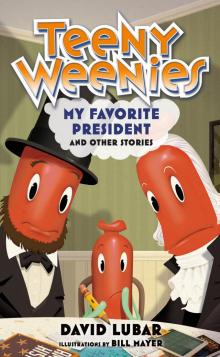 Teeny Weenies: My Favorite President
Teeny Weenies: My Favorite President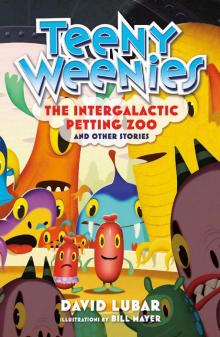 Teeny Weenies: The Intergalactic Petting Zoo
Teeny Weenies: The Intergalactic Petting Zoo Teeny Weenies: The Eighth Octopus
Teeny Weenies: The Eighth Octopus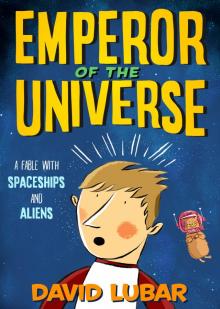 Emperor of the Universe
Emperor of the Universe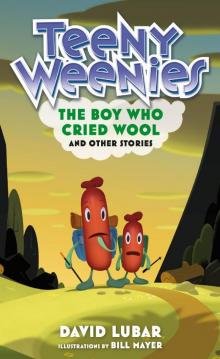 Teeny Weenies: The Boy Who Cried Wool
Teeny Weenies: The Boy Who Cried Wool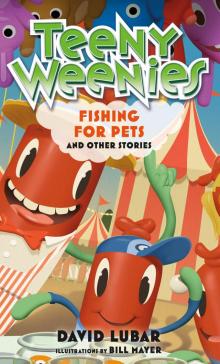 Teeny Weenies: Fishing for Pets
Teeny Weenies: Fishing for Pets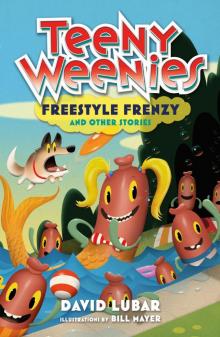 Teeny Weenies: Freestyle Frenzy
Teeny Weenies: Freestyle Frenzy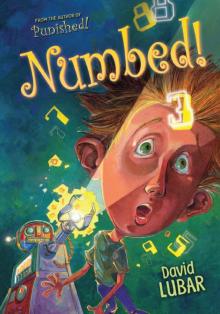 Numbed!
Numbed!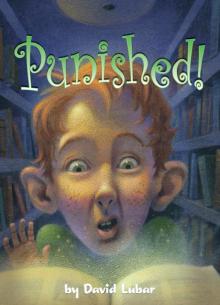 Punished!
Punished!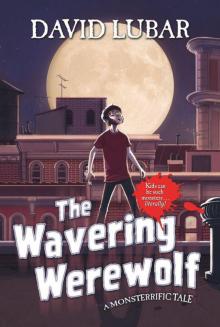 The Wavering Werewolf: A Monsterrific Tale (Monsterrific Tales)
The Wavering Werewolf: A Monsterrific Tale (Monsterrific Tales)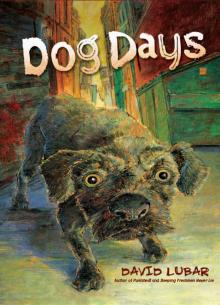 Dog Days
Dog Days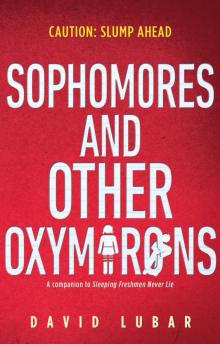 Sophomores and Other Oxymorons
Sophomores and Other Oxymorons The Psychozone
The Psychozone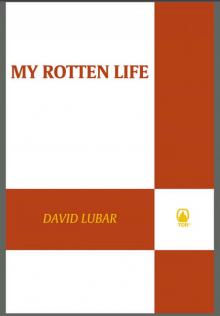 My Rotten Life
My Rotten Life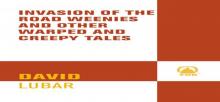 Invasion of the Road Weenies
Invasion of the Road Weenies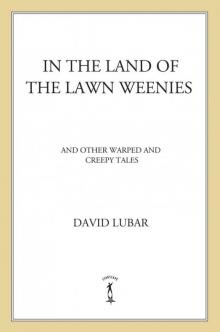 In the Land of the Lawn Weenies
In the Land of the Lawn Weenies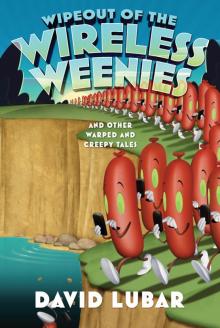 Wipeout of the Wireless Weenies
Wipeout of the Wireless Weenies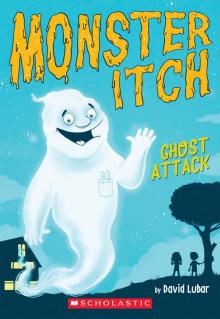 Ghost Attack
Ghost Attack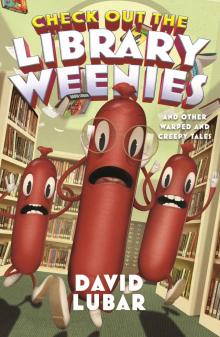 Check Out the Library Weenies
Check Out the Library Weenies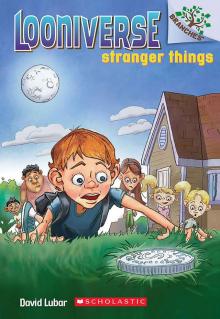 Looniverse #1: Stranger Things (A Branches Book)
Looniverse #1: Stranger Things (A Branches Book)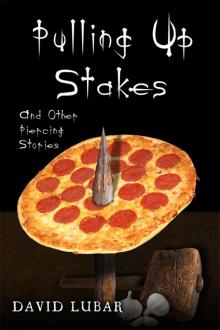 Pulling up Stakes and Other Piercing Stories
Pulling up Stakes and Other Piercing Stories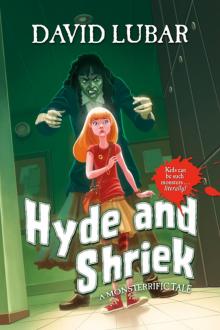 Hyde and Shriek
Hyde and Shriek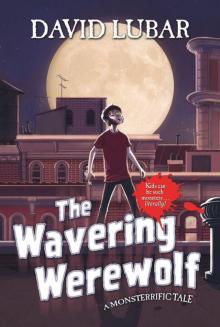 The Wavering Werewolf
The Wavering Werewolf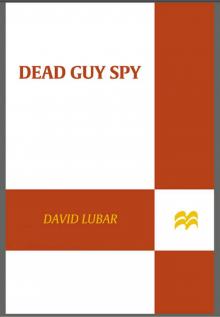 Dead Guy Spy
Dead Guy Spy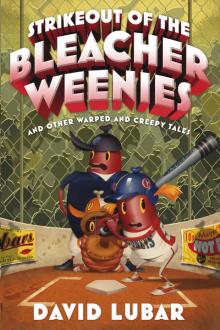 Strikeout of the Bleacher Weenies
Strikeout of the Bleacher Weenies The Big Stink
The Big Stink The Battle of the Red Hot Pepper Weenies
The Battle of the Red Hot Pepper Weenies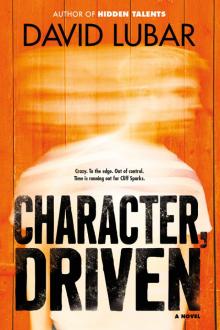 Character, Driven
Character, Driven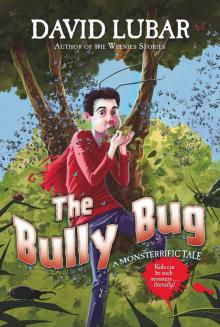 The Bully Bug
The Bully Bug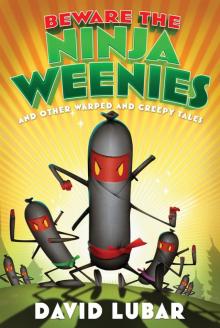 Beware the Ninja Weenies
Beware the Ninja Weenies Extremities: Stories of Death, Murder, and Revenge
Extremities: Stories of Death, Murder, and Revenge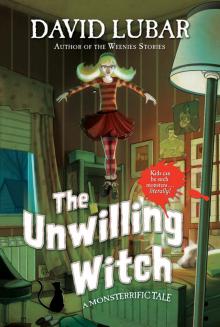 The Unwilling Witch
The Unwilling Witch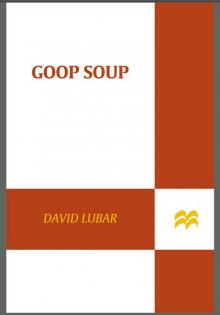 Goop Soup
Goop Soup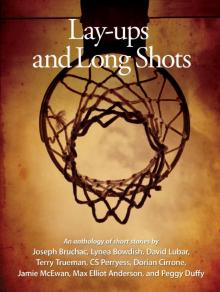 Lay-ups and Long Shots
Lay-ups and Long Shots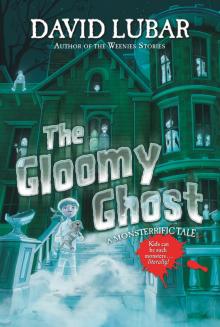 The Gloomy Ghost
The Gloomy Ghost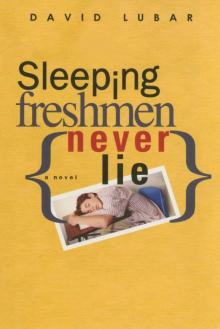 Sleeping Freshmen Never Lie
Sleeping Freshmen Never Lie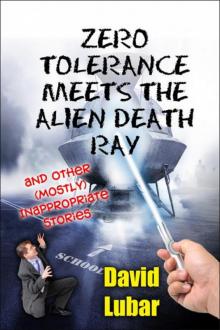 Zero Tolerance Meets the Alien Death Ray and Other (Mostly) Inappropriate Stories
Zero Tolerance Meets the Alien Death Ray and Other (Mostly) Inappropriate Stories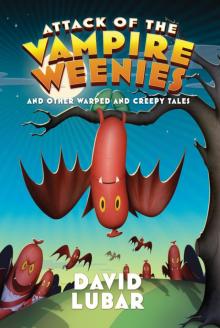 Attack of the Vampire Weenies
Attack of the Vampire Weenies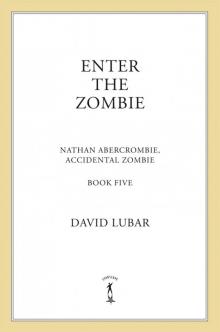 Enter the Zombie
Enter the Zombie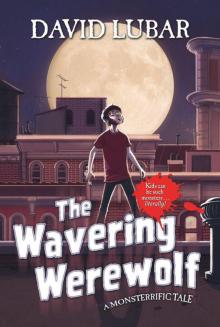 The Wavering Werewolf_A Monsterrific Tale
The Wavering Werewolf_A Monsterrific Tale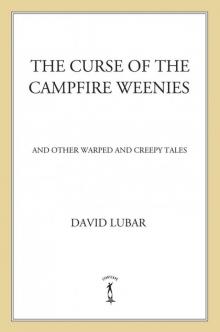 The Curse of the Campfire Weenies
The Curse of the Campfire Weenies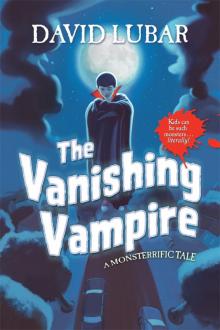 The Vanishing Vampire
The Vanishing Vampire